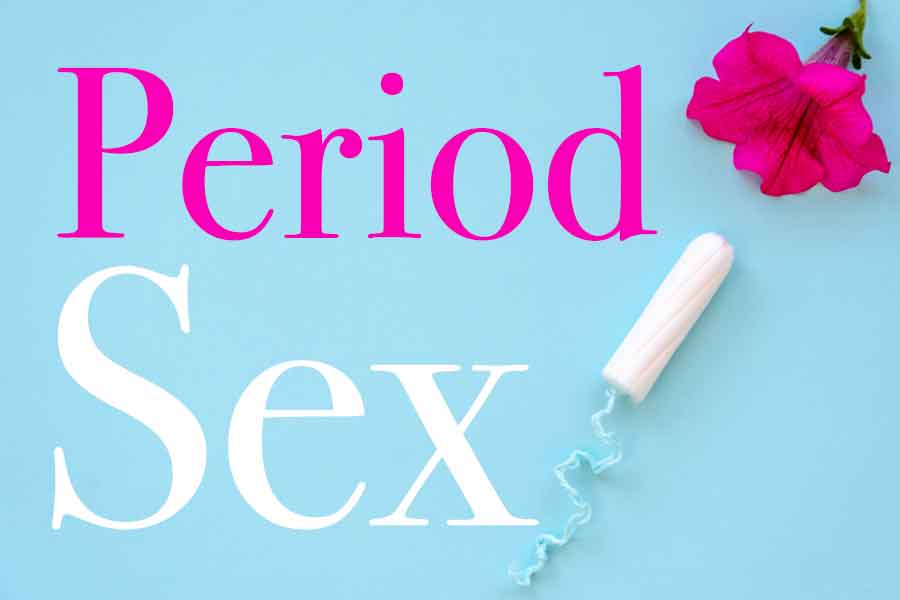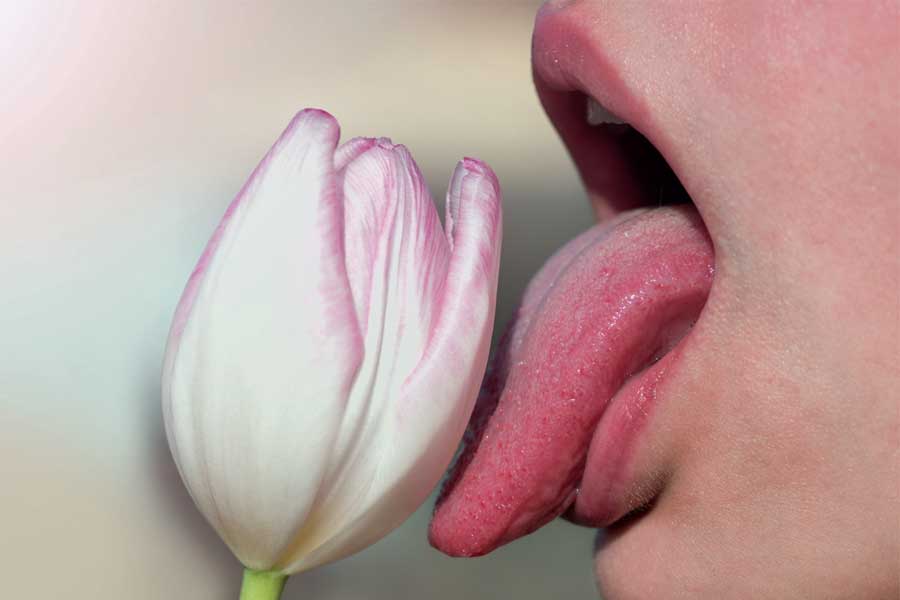Trusted for 24+ Years
Period Sex

Dr. Lisa Lawless, CEO of Holistic Wisdom
Clinical Psychotherapist: Relationship & Sexual Health Expert

Having sex during a period sometimes leaves people wondering about the pros and cons of doing it. Whether to do it or not is a matter of personal preference as there is no harm in it and there can be health benefits. Women, trans men, nonbinary, and genderqueer people can all have periods.
This article will review some of the most commonly asked questions about how to have sex during your period. We will review important information you need to know, such as its benefits, making it less messy, pregnancy and STD risks.
How Much Blood Comes Out?
Many people may think that a period is simply blood; however, it is blood, the lining of the uterus (endometrium), cervical mucus, and vaginal secretions. The amount of blood that comes out is 1-3 oz per menstrual cycle; however, the amount of blood can increase from health conditions such as hormonal imbalances, endometriosis, fibroids, polyps, adhesions, thyroid disorders, and more.
Managing The Blood
During a healthy sexual experience, the vagina's natural lubrication often gets on both partners. During period sex, vaginal secretions are mixed with blood and creates the potential for staining clothing or sheets. Having a waterproof throw on bedding is an ideal way to keep clean up easy so that you can focus on the pleasure of it.
How To Make Period Sex Easier
- Use a waterproof throw or towel before lying on the bed.
- Opt to have sex in the shower.
- Keep a wet washcloth or wipes nearby to clean up quickly.
- Have your partner wear a condom if applicable and desired to prevent pregnancy or STIs.
- Try positions such as on your side for less contact with the bed.
Extra Tip: Remember To Remove Your Tampon Or Menstrual Cup
If you use them, make sure to be mindful about removing a tampon or menstrual cup before you have sex, or it may get pushed far up into the vagina, making it challenging to retrieve. If you find that your tampon or menstrual cup is stuck, here are some tips on getting it out:
- Wash your hands well with soap and water.
- Sit on the toilet with your legs spread open.
- Gently bear down like you are going to push urine out.
- Relax, especially your pelvic muscles, because tensing will make it more difficult to retrieve.
- Your vagina is about two to four inches long, so you should be able to feel for the menstrual cup, string or the tampon with two fingers. Grasp it with both fingers in a pinching motion and pull.
If you cannot remove a tampon yourself, call your gynecologist or general practitioner for an appointment to have it removed because it is not healthy to have a tampon in for more than eight hours. Leaving it for more than that amount of time increases infection risks and toxic shock syndrome (TSS). Menstrual cups should also be removed after 12 hours, but they do not have the same risks as a tampon.
Menstrual Cups Vs. Menstrual Discs
The difference between a menstrual cup and a disc is in the name, where a menstrual cup is a deeper design that can hold more menstrual blood, rests below the cervix, and extends into the vaginal canal.
A menstrual disc rests further back into the vaginal fornix, where your vaginal canal meets the cervix and has a more shallow design. Menstrual discs can also handle a heavy flow of menstrual blood, but they must be changed more frequently because of their shallower design.
Menstrual discs may reduce some menstrual-related pain but do not ease cramping. This may have to do with them being more comfortable than tampons.
Most menstrual discs are not reusable and are meant to be disposed of after use. Those made from silicone may be reusable.
Like menstrual cups, menstrual discs pose a low risk of toxic shock syndrome (TSS). This rare bacterial infection can be avoided by practicing proper hygiene, cleaning discs and cups, and not using them for extended periods.
Menstrual discs are no more challenging to remove than a menstrual cup, but because they do not have a string or loop to help pull them out, it is recommended to use the same method as removing a menstrual cup.
Menstrual discs are desirable because they feel lighter and less noticeable, they allow for penetrative sex, and they can handle heavy flow periods.
Is Sex Appealing On Your Period?
During their period, many rely on masturbation to produce their orgasm(s) as some may feel self-conscious about the blood or have partners that dislike being exposed to it. Because it is not uncommon to experience a marked increase in hormones that influence libido during a menstrual period, craving sex during a period may be more substantial. While some postpone sex until after their period, others seek out a partner.
Oral Sex During Your Period
Some people are attracted to menstrual blood and desire their partner even more during menstruation. Usually, there is an aversion to oral sex (cunnilingus) during this time; however, some people enjoy it. If you desire to perform cunnilingus during a woman's period, it is perfectly okay. Again, it is truly a personal preference. Remember that all STD rules still apply. See more information through our Guide To Cunnilingus.
Health Benefits Of Period Sex
Sex during a period is beneficial and provides health benefits. People have found experiencing orgasm(s) during their menstrual period relieves menstrual cramps. This is because the uterine contractions of an orgasm help expel the menstrual fluid and relieves muscular tension in the uterus muscles, which is caused by the hormone prostaglandin. The following are the health benefits of having clitoral or vaginal orgasms during your period, which can be done solo or with a partner:
- Improves circulation, delivering nutrients that benefit your pelvic cavity, organs, tissue, ligaments, and more.
- Having an orgasm helps regulate the menstrual cycle by providing healthier and more balanced menstrual cycles.
- Muscle contractions provide lymphatic massage, which provides detoxification, improves digestion, and helps to prevent cancer.
- Sexual activity has been shown to increase fertility.
- Orgasms improve your mood by supporting the hypothalamus gland, responsible for regulating appetite, emotions, body temperature, and the pituitary gland responsible for hormones regulating ovulation and cervical fluid (vaginal lubrication).
- It helps provide healthy estrogen levels, supple vaginal tissue while protecting against osteoporosis and heart disease.
- It improves the immune system and thus boosts infection-fighting cells and can help prevent disease and fight colds and flu.
- Increases relaxation, which in turn boosts endorphin levels and flushes the stress hormone cortisol out of the body.
- Having at least three orgasms a week have less stress helps us look younger.
- Spikes nitric oxide and DHEA levels improving the brain's functioning and immune system and repairing tissue and promote healthy skin.
- Reduces pain, lowers the chance of headaches (including migraines), and eases childbirth pain.
- Increases oxytocin, which is a hormone linked to feelings of love, bonding as well as positive and empowering behavior.
Now that you know how good orgasms are check out our Best Sex Toys For Women Guide to help you achieve them.
Can You Get Pregnant During Your Period?
While you are least likely to get pregnant during your period, you can. During menstruation, the body is flushing out both the unfertilized egg and the lining that the body prepared for the possibility of a fertilized egg, so it is quite challenging to get pregnant during this time. Yet it is not impossible.
Sperm can reside inside the body for several days after sex, and a very slim chance exists that these several days will extend into the beginning of a woman's fertile period. The greater risk involved with having unprotected sex during a period is that it is mistaken for spotting or another mid-cycle bleeding. If this is the case, you may be inadvertently having unprotected sex when you are fertile.
Can You Get STDs During Your Period?
It is also essential to remember that menstruation does not protect either partner from contracting HIV or an STD. Both menstrual blood and vaginal secretions can transmit STDs and HIV, exposing your partner to greater risk.
Many with herpes experience flare-ups during menstruation, making themselves more vulnerable to HIV or other STD infections through open sores and their partner more susceptible to herpes. There is also some debate over whether sex during menstruation exposes you to a higher risk of pelvic inflammatory disease.
Managing Menstrual Pain
Having sex during your period can be enjoyable and healthy for you. Especially if you are having challenging menstrual symptoms, as it can relieve pain; for more information about this, please see our Menstrual Relief Guide and our guide on How To Reduce Menstrual Pain With A Vibrator.





